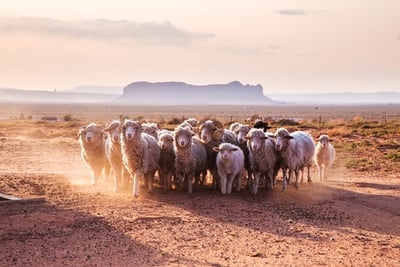When Jonathan Rudow goes into a community to conduct research, he is highly conscious of the fact that he arrives with a particular lens—a lens we each develop individually over the course of our lives evolving from our personal experiences, family values, and cultural conditioning. That lens never allows for the full picture, Jonathan insisted when he sat down with me recently to discuss his work with the Navajo (or the Diné people, as they refer to themselves) at Back Mesa in Arizona. The term “Diné,” meaning—“the people”—is a preferred descriptor for the tribe, Jonathan learned, because in the worldview of the Diné, amongst the many varied animals and “figures” in the world, “the people” are considered just one more of those figures that make up the world. The name “Navajo” was never a name the Diné took upon themselves.
These are important tenets to consider when one goes into a community very different from one’s own. Jonathan’s doctoral research is focused on how the worldview of certain persons of privilege, including Caucasians, males, or those considered “westerners” in modern culture, can be questioned or even decentralized in order to better understand those individuals and groups who are different from one’s self or experience. No matter who you are, when you come into a community asking questions as a researcher and an outsider—with the possibility of sharing any information you acquire to places in the world where those community members have never been and may never go—it’s critically important to question one’s own motives and approaches in order to be the most inclusive and respectful of both the people and the material, Jonathan points out.
Jonathan’s research work among the Diné took place at Black Mesa in Arizona. It’s important to note that “location” is not perceived by the Diné the same way it is for us, Jonathan told me. Location holds a particular weight for them because there are stories attached to place, and these stories are part of their teachings, which are not only educational in nature, but also very spiritual. These stories tend to connect the Diné to very particular places in the landscape, resulting in them being “place-based” people, Jonathan notes.
When Jonathan first visited Black Mesa (whose name refers to the coal located there), it was impossible not to respond to what he perceived as the devastation of the communities he encountered, due largely to a significant lack of resources. The availability of water in some areas is a tremendous problem: much of their water has to be fetched from wells that are often far away. Depending on a family’s location, it can take four or five hours to get to a well, Jonathan relates, and then they might spend the rest of the day procuring the water and returning home with it. A family may have to do this weekly, bi-weekly, or monthly, depending on the size of water containers they own. This realization that people “in his own back yard” (not just in far off countries in other parts of the world) did not have access to water, really impacted him during his research.
In our conversation, Jonathan shared historical accounts he has heard from various members of tribe, including the devastation wrought by Indian boarding schools, and by Public Law 93-531 (the Navajo and Hopi Settlement Act¹) which conveniently seemed to displace both Hopi and Diné families who lived right on the line where the coal deposits were found. Much of the destitution evident on the reservation today stems from this Settlement act, according to some accounts. There are also rampant health issues resulting from mining occurring on the reservation. Although much of the water on the reservation is contaminated, many families have no options other than to use the existing water sources for cooking, drinking, and bathing, resulting in ongoing intergenerational health issues from these issues.
 Also in our conversation, Jonathan shared some personal stories about what he observed regarding relationship to the land at Black Mesa, including one about a grandmother in her eighties who still made the arduous journey each year to help plant and harvest the corn in the family plot, and another about his experience of herding sheep for 8-10 hours a day, during which he experienced silence in a way he never had before. That silence, he says, is vitally important to both the culture and language of the Diné. It comes from the land itself, which is truly where they get their language from... (Click here to read the full post and listen to the audio interview at Pacifica Post)
Also in our conversation, Jonathan shared some personal stories about what he observed regarding relationship to the land at Black Mesa, including one about a grandmother in her eighties who still made the arduous journey each year to help plant and harvest the corn in the family plot, and another about his experience of herding sheep for 8-10 hours a day, during which he experienced silence in a way he never had before. That silence, he says, is vitally important to both the culture and language of the Diné. It comes from the land itself, which is truly where they get their language from... (Click here to read the full post and listen to the audio interview at Pacifica Post)